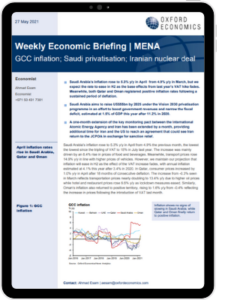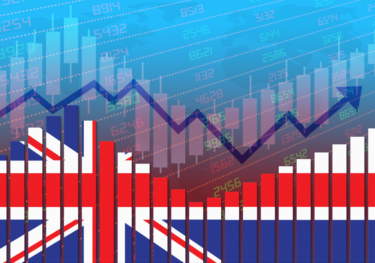MENA | GCC inflation; Saudi privatisation; Iranian nuclear deal

Saudi Arabia’s inflation rose to 5.3% y/y in April from 4.9% y/y in March, but we expect the rate to ease in H2 as the base effects from last year’s VAT hike fades. Meanwhile, both Qatar and Oman registered positive inflation rates following a sustained period of deflation.
What you will learn:
- Saudi Arabia aims to raise US$55bn by 2025 under the Vision 2030 privatisation programme in an effort to boost government revenues and narrow the fiscal deficit, estimated at 1.5% of GDP this year after 11.2% in 2020.
- A one-month extension of the key monitoring pact between the International Atomic Energy Agency and Iran has been extended by a month, providing additional time for Iran and the US to reach an agreement that could see Iran return to the JCPOA in exchange for sanction relief.
- Saudi Arabia’s inflation rose to 5.3% y/y in April from 4.9% the previous month, the lowest the lowest since the tripling of VAT to 15% in July last year.
Tags:
Related Services

Post
UK : The everyday economy matters to local economic performance
The everyday economy generates half of all UK employment and 33% of GVA but is often dismissed because it generates less growth than high value services and has low productivity. But indirectly it has the capacity to improve the competitiveness and performance of local economies and has been identified by Labour Party leaders as a sector to focus on, if they win the election.
Find Out More
Post
Amid disruption, what can US office learn from retail?
We examined the disruption of generative AI at the US county level. We identified several metros – Atlanta, Denver, New York, San Francisco, and Washington DC – that had at least one county with the highest percent of displaced workers from AI.
Find Out More